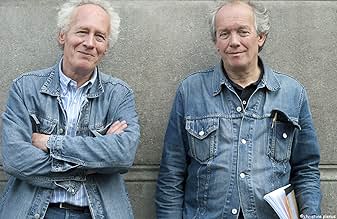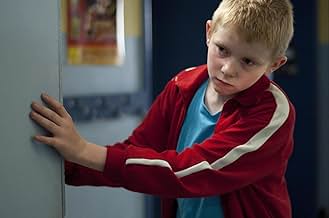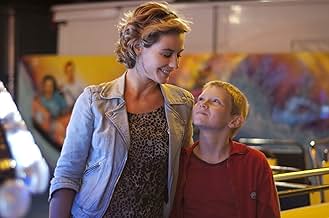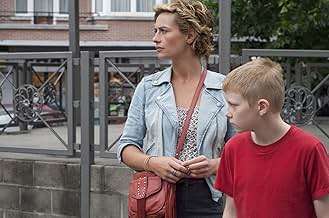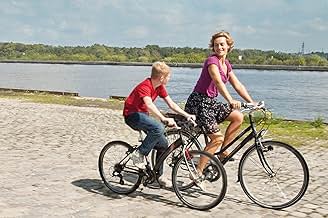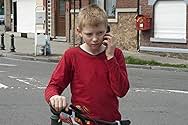NOTE IMDb
7,4/10
29 k
MA NOTE
Abandonné par son père, un jeune garçon est placé dans un foyer pour jeunes. Par bonté, la coiffeuse du village accepte de le prendre les week-ends.Abandonné par son père, un jeune garçon est placé dans un foyer pour jeunes. Par bonté, la coiffeuse du village accepte de le prendre les week-ends.Abandonné par son père, un jeune garçon est placé dans un foyer pour jeunes. Par bonté, la coiffeuse du village accepte de le prendre les week-ends.
- Réalisation
- Scénario
- Casting principal
- Récompenses
- 9 victoires et 31 nominations au total
Cécile de France
- Samantha
- (as Cécile De France)
Samuel De Ryck
- Éducateur 2
- (as Samuel De Rijk)
Avis à la une
The Kid with a Bike (2011)
A troubled boy finds an informal foster mom who tries her best to keep in line. That's the story and in way that's the whole depth of the story. The details—his rebellion, his responding to love, his being suckered by a drug dealer—are expected and interesting and beautifully told. The story has a slightly polished realism to separate it from its forebear, the great classic "The Bicycle Thief," and there might be a slight gap in motivations to explain, but in general you get sucked into this situation and the awkward relationship between the two. It is a tale appreciated in its siimple telling.
I had a foster child for a couple of years at an age close to this boy's, and there is a lot here that makes vivid sense. The woman, perhaps too lovely for normal realism (played by Cecile De France), is nevertheless sincere and quite smart in her mothering skills. She gets the boy to live with her almost by chance, and follows that chance, and learns to give him some rope and to also reign him in by example and through compassion.
But even this isn't enough. That's one of the terrifying truths of being a foster parent (or any parent)—you can only do your best. Some of the result is a product of luck, or personality, or some course of outside events that you don't predict (even if later you can say you saw them coming). All of this is included here, well done, with a kind of filmic modesty.
The one bit of high drama comes down to the child pushing his limits when he gets into a criminal plan, and the results of that, which leads to a bit of small time revenge that goes wrong. The boy is now beyond his own limits and is literally stunned. By the last scene, you ought to be heartbroken but also really hopeful. The message finally is that kids are really resilient, and you have to keep opening the right doors for them and let them make good choices.
This film lets us do that.
A troubled boy finds an informal foster mom who tries her best to keep in line. That's the story and in way that's the whole depth of the story. The details—his rebellion, his responding to love, his being suckered by a drug dealer—are expected and interesting and beautifully told. The story has a slightly polished realism to separate it from its forebear, the great classic "The Bicycle Thief," and there might be a slight gap in motivations to explain, but in general you get sucked into this situation and the awkward relationship between the two. It is a tale appreciated in its siimple telling.
I had a foster child for a couple of years at an age close to this boy's, and there is a lot here that makes vivid sense. The woman, perhaps too lovely for normal realism (played by Cecile De France), is nevertheless sincere and quite smart in her mothering skills. She gets the boy to live with her almost by chance, and follows that chance, and learns to give him some rope and to also reign him in by example and through compassion.
But even this isn't enough. That's one of the terrifying truths of being a foster parent (or any parent)—you can only do your best. Some of the result is a product of luck, or personality, or some course of outside events that you don't predict (even if later you can say you saw them coming). All of this is included here, well done, with a kind of filmic modesty.
The one bit of high drama comes down to the child pushing his limits when he gets into a criminal plan, and the results of that, which leads to a bit of small time revenge that goes wrong. The boy is now beyond his own limits and is literally stunned. By the last scene, you ought to be heartbroken but also really hopeful. The message finally is that kids are really resilient, and you have to keep opening the right doors for them and let them make good choices.
This film lets us do that.
This film takes place in Europe (Belgium, apparently) so it has far less of the violence that would accompany the same story set in America. But otherwise the story is particularly painful to watch because the essential elements - a kid without a father, his self-hate and anger, the substitute father figures laying in wait - are directly relevant to the American context. In a lean, tough story, the film takes us through a broad tour of the issues and risks and even reasons for hope in these situations. Young Thomas Doret fiercely embodies the aching and the rage of a boy who wants a father at any price and is a near-force of nature in trying to obtain what should be his by right. Cécile De France's Samantha has numerous real-life counter-parts, credited by more than one survivor of these dilemmas, but not always successful in their roles as passionate rescuers. How this particular story turns out is not so important as the realization that all across the world children live in Cyril's situation; some make it, many don't.
Greetings again from the darkness. When Guy (Jeremie Renier) states that he can't take care of his son Cyril (Thomas Douret) right now, I felt a rush of anger and disgust. Imagine if you were his 11 year old son hearing those words. Young kids should be able to count on their parents for emotional security above all else. There should be no fear of abandonment ... those are issues no child should be forced to deal with (barring a natural disaster).
The Belgium writer/director team of brothers Jean-Pierre and Luc Dardenne have a history of taking on parenthood and childhood in a head-on manner. Cyril is dumped in an orphanage by his dad, and is convinced that he is just misplaced, not abandoned. So being the fiercely determined kid he is, he re-traces his steps from coffee shops to bars to their old apartment. Cyril is convinced his dad never would have sold his treasured bicycle, no matter how desperate for money he was.
Whatever confusion and hostility that you think Cyril might experience, once he confronts his dad, the filmmakers display it in the rawest possible form. Cyril is a symbol of need, hiding behind a wall of rebellion. A chance encounter with Samantha (Cecile de France) leads to weekend visitations and the start of an awkward quasi-family life for both of them. Cyril tests Samantha and all other authority figures in every possible manner, often to the breaking point.
As a parent, it's easy to spot the vulnerabilities that a child faces before they have the maturity to handle it. We see how easily Cyril falls in with the wrong crowd and how quickly things can get really bad. Luckily for Cyril, Samantha doesn't abandon him. She answers "I don't know" to his question of why she let him stay with her. Although, the filmmakers never let us in on her deepest thoughts, we suspect she was once not all so different than Cyril, and someone stepped up for her.
This film won the Grand Jury Prize at Cannes in 2011 and it's easy to see how. It shows how difficult and messy ordinary life can be, but how often things turn out OK, though rarely perfect. Film lovers will recognize Cecile de France from her many films, including the recent Hereafter and the excellent Mesrine.
The Belgium writer/director team of brothers Jean-Pierre and Luc Dardenne have a history of taking on parenthood and childhood in a head-on manner. Cyril is dumped in an orphanage by his dad, and is convinced that he is just misplaced, not abandoned. So being the fiercely determined kid he is, he re-traces his steps from coffee shops to bars to their old apartment. Cyril is convinced his dad never would have sold his treasured bicycle, no matter how desperate for money he was.
Whatever confusion and hostility that you think Cyril might experience, once he confronts his dad, the filmmakers display it in the rawest possible form. Cyril is a symbol of need, hiding behind a wall of rebellion. A chance encounter with Samantha (Cecile de France) leads to weekend visitations and the start of an awkward quasi-family life for both of them. Cyril tests Samantha and all other authority figures in every possible manner, often to the breaking point.
As a parent, it's easy to spot the vulnerabilities that a child faces before they have the maturity to handle it. We see how easily Cyril falls in with the wrong crowd and how quickly things can get really bad. Luckily for Cyril, Samantha doesn't abandon him. She answers "I don't know" to his question of why she let him stay with her. Although, the filmmakers never let us in on her deepest thoughts, we suspect she was once not all so different than Cyril, and someone stepped up for her.
This film won the Grand Jury Prize at Cannes in 2011 and it's easy to see how. It shows how difficult and messy ordinary life can be, but how often things turn out OK, though rarely perfect. Film lovers will recognize Cecile de France from her many films, including the recent Hereafter and the excellent Mesrine.
without any introductions, the film gets down to the story. a kid on the phone is all but accepting to hear that the number he dialed is out of service. a precisely fluid social humanist film about a 11 year old kid and his relentless quests to go all the way to, against everybody's wishes, find a parent that wants nothing to do with him. basing his stance on the argument that his father would never leave without leaving him his bike.
once retrieved, the bike serves as the catalyst that allows the kid to advance, more in a figurative sense; we see him fight and bite for it. the last relic of a family life to him.
the kid in red is a lot of things: determined with rage and astounding obstinacy, always on the move, has nothing to lose so he goes to the limits. at one point, he nervously plays with a faucet as to not lose face in front of such injustice. but in his misfortune, Samantha, an adult portraying a kind stranger and genuine goodness, generosity and warmth, takes care of him. being emotionally distant, the kid rejects her at first and goes on exploring until he finally finds himself in his most despairing moment.. the kid remains a very interesting character to me, he is easy to deceive, capable of violence, but only because he is affectionate at heart and more honest than the people he deals with. which resonates with me as the film is able to kindle bits of memories of the audience.
once retrieved, the bike serves as the catalyst that allows the kid to advance, more in a figurative sense; we see him fight and bite for it. the last relic of a family life to him.
the kid in red is a lot of things: determined with rage and astounding obstinacy, always on the move, has nothing to lose so he goes to the limits. at one point, he nervously plays with a faucet as to not lose face in front of such injustice. but in his misfortune, Samantha, an adult portraying a kind stranger and genuine goodness, generosity and warmth, takes care of him. being emotionally distant, the kid rejects her at first and goes on exploring until he finally finds himself in his most despairing moment.. the kid remains a very interesting character to me, he is easy to deceive, capable of violence, but only because he is affectionate at heart and more honest than the people he deals with. which resonates with me as the film is able to kindle bits of memories of the audience.
Cyril, a young boy of about 12, is abandoned by his deadbeat father in the care of some sort of group home. He obsessively tries to reunite with his father, and in the process, falls into the hands of a surrogate mother... and a rather shady surrogate father. The Dardennes aren't straying much from their established style, but there's no reason to. Again, we have a highly effective look at people in emotional crisis and in the grips of moral dilemmas. Throughout the film you're questioning your reactions to things (boy, that Cyril seems like an awful little monster at first) or asking "What would I do?" Again, the camera-work is immediate and unfettered by stylistic flourishes, putting you right inside the lives of these characters. Again, the performances are so natural they feel almost documentary. While I don't think Thomas Doret is as powerful a young actor as Emilie Dequenne in ROSETTA or other Dardenne leads, he does win you over after an unsympathetic start. The movie deals with several parallel themes, the most prominent being one of finding love and acceptance where you can, but it doesn't simply hammer on that one and leaves room for other avenues. I'm not sure yet if I would put this among the best of the Dardennes, but it made a strong first impression.
Le saviez-vous
- AnecdotesFor both the moments where Cyril is running from the police and ends up in the doctor's office and the opening scene when he's using the phone and won't let go, the young actor was just instructed by the directors not to give up what the character was doing under any circumstance.
- GaffesWhen the hairdresser is leaving the orphanage after she returned Cyrill's bike the car she is driving makes the sound of Diesel engine, but in the next scene with the same car the car sounds like it has a petrol engine.
- Citations
Guy Catoul: It's too much. I can't look after him.
- ConnexionsFeatured in At the Movies: Cannes Film Festival 2011 (2011)
- Bandes originalesAdagio un poco mosso
from Piano Concerto No. 5, Op. 73
written by Ludwig van Beethoven
performed by Alfred Brendel and the London Philharmonic Orchestra
conducted by Bernard Haitink
Meilleurs choix
Connectez-vous pour évaluer et suivre la liste de favoris afin de recevoir des recommandations personnalisées
- How long is The Kid with a Bike?Alimenté par Alexa
Détails
- Date de sortie
- Pays d’origine
- Sites officiels
- Langue
- Aussi connu sous le nom de
- The Kid with a Bike
- Lieux de tournage
- Sociétés de production
- Voir plus de crédits d'entreprise sur IMDbPro
Box-office
- Montant brut aux États-Unis et au Canada
- 1 470 000 $US
- Week-end de sortie aux États-Unis et au Canada
- 45 933 $US
- 18 mars 2012
- Montant brut mondial
- 7 182 147 $US
- Durée1 heure 27 minutes
- Couleur
- Mixage
- Rapport de forme
- 1.85 : 1
Contribuer à cette page
Suggérer une modification ou ajouter du contenu manquant



